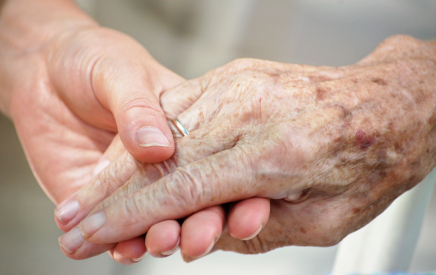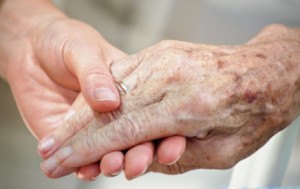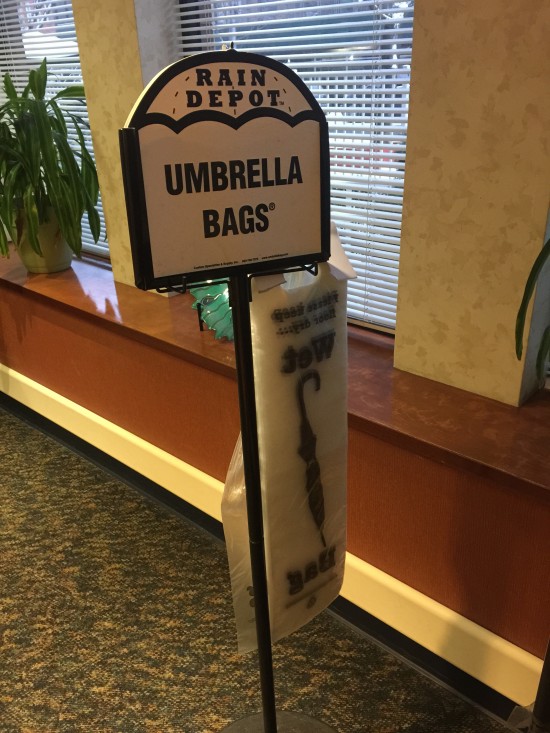Category: Communication
Posted by Dr. El - September 3, 2015 - Business Strategies, Communication, McKnight's Long-Term Care News, Talks/Radio shows

It’s time for McKnight’s Fall Online Expo!
I’m pleased to be presenting at 11am ET on Wednesday, September 9th on the topic of “Letting Them Go with Style.” This free hour-long webinar will focus on how to use the loss of employees to strengthen your organization.
The other two webinars will address reimbursement and technology. The Expo will also offer the opportunity to earn CE credits, visit with vendors and chat with colleagues. It’s a great way to attend a conference without leaving your desk. I highly recommend it.
For more information and to register, visit McKnight’s Fall Expo.
Hope to see you there!

Posted by Dr. El - September 2, 2015 - Business Strategies, Communication, Customer service, Engaging with families, McKnight's Long-Term Care News

Here’s my latest article on McKnight’s Long-Term Care News:

A study about rudeness in the medical journal Pediatrics got me thinking about the possible effects of rudeness in long-term care.
In “The Impact of Rudeness on Medical Team Performance: A Randomized Trial,” teams were subjected to rude comments by a supposed visiting medical colleague. For example, he suggested that the team members in the neonatal intensive care unit (NICU) “wouldn’t last a week” in his country.
Compared to the control group, teams that had been exposed to the rude comments had lower diagnostic and procedural performance scores.
Naturally, I wondered how this research might translate to senior living.
I’m sure I’m not the only person who has observed rudeness occurring in eldercare settings, whether it’s an administrator being curt with staff, nasty remarks between staff members, a discourteous statement to or from a resident, or a sharp comment by a family member.
To complicate matters, LTC teams are often multi-cultural. What’s considered reasonable for one culture may be deemed rude by another culture.
In addition, a comment can be interpreted differently depending on the ages and genders of the people involved. If an older female staff member compliments a young woman on her outfit, it can come across differently than if an older male staff member similarly compliments his young female colleague.
Long-term care is also very hierarchical. Doctors often “get away with” rude comments to nurses, as do administrators with underlings.
The research, however, suggests that nobody is getting away with anything. Rude statements negatively affect team performance in the NICU and, I suspect, in teams everywhere.
The good news is that the study found two behaviors reduced the impact of rudeness: information sharing lessened the negative impact of rudeness on diagnostic scores and help-seeking reduced the adverse impact of rudeness on procedural performance scores.
Here are some ways to address rudeness in LTC:
For the entire article, visit:

Posted by Dr. El - July 15, 2015 - Communication, Dementia, Inspiration, Technology, Transitions in care

I wrote about the White House Conference on Aging last October, noting that it was a “once-a-decade” national conference about the needs of our aging population.” (McKnight’s LTC News, October 2014)
Below, LeadingAge summarizes the 2015 White House Conference on Aging, which took place on Monday:
After a year’s worth of collecting data and opinions, experts from the field of aging presented new ideas and initiatives at the 2015 White House Conference on Aging (WHCOA).
The White House Conference on Aging facilitated a national conversation on growing older in America through live-streaming social media. LeadingAge hosted a watch party and found the following highlights noteworthy:
- A Call for Caregiver Support Systems: Panelists stressed the importance of establishing support systems for the nation’s 50 million professional and family caregivers, whose numbers will double by the year 2050.
- CMS Proposed Rule: CMS proposed Reform of Requirements for Long-Term Care Facilities, which would affect more than 15,000 nursing homes and skilled nursing facilities. A element of the proposal is new standards for coordinating facility-to-facility patient transfers in order to improve quality of life, enhance person-centered care and services for residents in nursing homes, and improve resident safety.
- HHS Secretary Announces Funding for Workforce: Sylvia Burwell, secretary of the U.S. Department of Health and Human Services (HHS) announced $35.7 million for a new Geriatric Workforce Enhancement Program, preparing the health care workforce to respond to the needs associated with advancing age.
- Dementia Friendly America: A coalition of private sector organizations announced the Dementia Friendly America initiative, which was created to foster communities that are equipped to support people with dementia and their families. There are currently plans to build 15 new pilot sites across the country.
For the rest of the article, visit:

Posted by Dr. El - July 8, 2015 - Communication, End of life, Engaging with families, McKnight's Long-Term Care News, Resident education/Support groups

Here’s my latest article on McKnight’s Long-Term Care News:

I walked into Mr. Hobart’s room, ready for my initial evaluation. He was a thin, graying man whose loose clothes hung in folds around him. He’d spent every day last week in chemo.
He spoke quietly, discussing his estrangement from his family and the good old days hanging out at the bar. None of his drinking buddies were around. He had no visitors.
Following our talk, I stopped at the nursing station. “What’s his prognosis?” I asked the nurse. “Not good,” she said. I paid a visit to the social worker and asked softly but very bluntly, “Is there a reason we’re medically torturing this man?” “We wanted to put him on hospice, but his brother won’t return my calls,” she told me. She promised to try again. By the next week, hospice services had been arranged. Mr. Hobart died five weeks later.
Unfortunately, this scenario is a fairly typical approach to end-of-life procedures in long-term care. The case highlights common end-of-life challenges in LTC facilities:
• No clear leadership within the treatment team regarding end-of-life care — Often team members, regarding this as a medical situation, expect that the physician will be addressing these issues with the resident and their family. The physician, on the other hand, may view dying as an emotional issue and expect that the social worker and other team members will be handling it.
• Lack of communication with the resident regarding end-of-life wishes — With no designated team member to broach the topic, residents often follow along with the care plan assuming they’re going to get better and that someone will tell them when they’ve reached the point where medical interventions are unlikely to help.
• Lack of communication with family members regarding prognosis and care decisions — Addressing treatment decisions and whether or not to consider hospice or palliative care is often a time-consuming series of discussions with family members and it needs to be handled with sensitivity. This can be difficult to manage in what’s become an ever fast-paced care environment.
• Aggressive medical treatments with very low likelihood of success — There are increasing numbers of medical treatments that can be performed, but questions arise about whether they should be: Is the treatment likely to help? Has the resident been properly informed of the risks and side effects of the treatment? Does the resident understand how it will affect his or her quality of life? Atul Gawande, MD addresses these questions eloquently and in detail in his book, “Being Mortal,” which I highly recommend.
• Late referral to hospice — Hospice is an excellent support for residents and their families. (Unlike in LTC facilities, the entire family –— not just the resident — is seen for treatment.) Most often, however, the referral for hospice services is made when the resident has days or weeks rather than months to live and much of the benefit of hospice services is lost.
As organizations that serve people who are ill and in the last years of their lives, we can create better deaths by improving end-of-life care.
• Establish an end-of-life care committee — Select and train members from various disciplines to be part of the committee. This specialized group can work with the resident’s ongoing treatment team to speak with the resident and their family members about end-of-life care and decision-making.
• Use available tools to discuss care decisions with residents and their families — Here are two resources to be aware of:
For the entire article, visit:

Portrait of multi generations Indian family at home. Asian people living lifestyle.
Posted by Dr. El - July 2, 2015 - Communication, End of life, Engaging with families, Resident care

Here’s an important article in the New York Times Opinionator Column by Ellen Goodman, one of the founders of The Conversation Project (which I’m about to investigate further). Note her comment that she expected her mother’s doctors to tell her what to do. The families of our residents are expecting the same from us.
I was 25 when I flew home for my father’s last birthday. His cancer had returned and he would die three months later at the age of 57. What I remember most about that weekend was the large rectangular gift box he opened. My mother had bought him a new suitcase.
I don’t know if that suitcase qualifies my family for the Denial Hall of Fame. There are so many contenders for that honor. But I’ve carried the psychic baggage over the years. I have never forgotten that image and how we lost a chance to say goodbye. I still wonder if my father was lonely in the silence that surrounded our inability to talk about what we all knew.
Decades later my mother began a long slow decline. By then, I was a newspaper columnist, a job that I often described as “telling people what you think.” I was professionally outspoken. But little had changed since my father’s death.
Yes, my mother and I talked about everything — but we didn’t talk about how she wanted to live toward the end. The closest we ever came to discussing her wishes was when she would see someone in dire straits and say, “If I’m ever like that, pull the plug.” But most of the time there is no plug to pull.
Gradually and painfully, my mother lost what the doctors call “executive function,” as if she were a C.E.O. fumbling with Excel spreadsheets, not a 92-year-old who couldn’t turn on the television or make a phone call. Eventually, she couldn’t decide what she wanted for lunch, let alone for medical care.
In some recess of my mind, I still assumed that death came in the way we used to think of as “natural.” I thought that doctors were the ones who would tell us what needed to be done. I was strangely unprepared, blindsided by the cascading number of decisions that fell to me in her last years.
For the rest of the article, visit:

Posted by Dr. El - June 24, 2015 - Business Strategies, Communication, McKnight's Long-Term Care News, Resident care

Here’s my latest article on McKnight’s Long-Term Care News:

An experienced colleague was recently let go from her job to which she’d been dedicated for 10 years. “We want to take things in a different direction,” she was told by the administrator. “Pack up your office and go.”
An hour later, she was in the parking lot holding a box containing a photo of her kids and mementoes of a decade as head of the social service department. Her replacement started two days later.
There are, of course, occasions when people who are fired or otherwise are terminating employment and need to be escorted from the building. But many workers are career professionals who wouldn’t consider burning bridges with bad behavior. Despite this, I’ve witnessed hasty dismissals and hushed resignations on multiple occasions throughout my career.
Sometimes, departing coworkers will tell me they didn’t want to let anyone know they were leaving because they didn’t want to deal with the residents’ being upset.
In my training to become a psychologist, we spent a great deal of time discussing endings and termination of treatment. While work in long-term care isn’t necessarily a psychotherapeutic relationship, I believe leave-takings in LTC are more important than in other settings and that the style of departure should be given more consideration.
Here are some aspects to consider:
• Due to the nature of the work, staff members form deep relationships over time with the residents and their families. When we depart, it matters to them.
• Because we work with elders and those who are ill, people are constantly leaving — through death, discharges, and hospital transfers — often suddenly and without the chance to say goodbye. This can create small traumas. In compassionately addressing our departures, we have the opportunity to reduce the amount of trauma in the lives of our residents rather than contribute to it.
For the entire article, visit:

Posted by Dr. El - June 5, 2015 - Communication, Engaging with families

I’m writing to you from my hotel room in Ontario, Canada today, where I’m finishing up some last minute details before heading out to give a training program on preventing senior bullying (iron suit — check!).
This week’s post comes from Abby Ellin, writing in the NYTimes Money column about the use of elder mediators to help families jointly and sanely make difficult decisions about elder care.
ROSIE, Therese and Linda McMahan were always close, but after their father died unexpectedly in 2011, they found their relationship strained.
They did not know what to do for their 84-year-old mother, Rose, and their brother, Paul, 53, who has cognitive disabilities and is in a wheelchair. The sisters tried to find an assisted-living home nearby, in the Boston area, but couldn’t. And so after many months, they decided that their mother and brother would move in with Rosie’s family in Amherst, Mass.
“We were all confused and upset about the situation,” said Rosie, 51, who is an educator and a counselor for teenagers. “We had so many questions. How much respite should my sisters offer me? Should Mom’s name stay on the deed of the house? Where will either of them go if I can’t keep taking care of them?”
“It was hard to figure it out,” said Therese, 50, a midwife in Somerville, Mass. “How do we make decisions? What do we all feel comfortable with? What are the guidelines we’re going to adhere to? Every conversation ended with someone crying or hanging up, or both.”
To help them navigate those difficult waters, they went to mediation to learn how to “stay in each other’s life and not have it be destructive,” as Rosie put it. “We wanted to stay connected as siblings, but if you don’t get someone else to help you out, you kind of fall prey to your childhood antics. A mediator makes a hard job a little easier.”
For the rest of the article, click below:

Big family together sisters and mother
Posted by Dr. El - April 10, 2015 - Anecdotes, Communication

This Washington Post article by Louise Aronson, MD perfectly describes the failures of our current medical system to address the problems that affect older patients.
The clinic was in a dilapidated old building, yet the entryway retained a worn grandeur. Tapering, semicircular walls extended like welcoming arms, and a half-moon of sidewalk stretched to the quiet side street.
That’s where I first saw her, standing at the curb with her cane propped on her walker, squinting toward the nearby boulevard. The woman was clearly well into her 80s, with a confident demeanor and with clothes and hair that revealed an attention to appearance. She had a cellphone in one hand and seemed to be waiting for a ride.
I had been heading into the clinic for a 4:30 p.m. appointment, and when I came back out, night had fallen. But for her tan winter coat and bright scarf, I might have missed her leaning against the clinic’s curved wall. She still held the cellphone, but now her shoulders were slumped and her hair disheveled by the cold evening breeze.
I hesitated. On one side of town, my elderly mother needed computer help. On the other, our dog needed a walk, dinner had to be cooked and several hours of patient notes and work e-mails required my attention.
I asked this woman whether she was okay. She looked at the ground, lips pursed, and shook her head. “No,” she said. “My ride didn’t come, and I have this thing on my phone that calls a cab, but it sends them to my apartment. I don’t know how to get them here, and I can’t reach my friend.”
She showed me her phone. The battery was now dead. I called for a taxi with my phone. She was tired and cold by then and suddenly seemed frail.
We chatted as we waited. She owned a small business downtown — or she had. She was in the process of retiring, having been unable to do much work in recent months because of illnesses. She’d been hospitalized twice in the past year, she said. Nothing catastrophic, yet somehow after the second stay things had never quite gotten back to normal.
The geriatrician in me noted that she had some trouble hearing, even more difficulty seeing, arthritic fingers and a gait that favored her right side. But her brain was sharp, and she had a terrific sense of humor.
For the rest of the article, visit:

Posted by Dr. El - April 1, 2015 - Communication, End of life, McKnight's Long-Term Care News, Resident care, Transitions in care

Here’s my latest article on McKnight’s Long-Term Care News:

As a psychologist observing the effects of medical interventions on the mental health of the long-term care resident, I often ask, “Is this aggressive procedure helping?”
Such a well-intended question can prompt the team to reconsider the course of treatment or to affirm that care is in line with the wishes of the resident and their family.
Conversely, I do what I can to encourage my residents to comply with medical recommendations. When a resident presents with end-stage renal disease (ESRD) and the inevitable recommendation of hemodialysis is given, I work with them to adjust to this turn of events.
That’s why I was surprised to read in Paula Span’s “New Old Age” article in the New York Times last week, “Learning to Say No to Dialysis,” that dialysis isn’t always the best course of treatment for older patients.
Span reports that while dialysis can be very successful for younger and healthier patients, about 40% of patients with ESRD over the age of 75 die within a year and only 19% survive over four years. One study found that 58% of nursing home residents died within a year. Meanwhile, 61% of patients in a Canadian study said they regretted starting dialysis.
What leads to regrets tend to be the following factors, which can contribute to feelings of depression among those on a renal program:
• Physical symptoms such as pain, fatigue, nausea and headaches
• The amount of time spent on dialysis
• Inability to travel
• Dietary restrictions
Span quotes nephrologist Dr. Alvin H. Moss, who notes, “Patients are told, ‘You have to go on dialysis or you’ll die,’ rather than, ‘You could have up to two years without the treatment, without the discomfort, with greater independence.’” I’ve been part of teams that have told residents the exact words of that first message.
Medical management
For older patients, particularly those with other health problems, Dr. Moss asserts that medical management might be a way for them to focus on extending their quality of life and avoiding the discomforts of dialysis. The American Society of Nephrology suggests discussing this alternative to dialysis with patients through a shared decision-making process, as noted in their Choosing Wisely guidelines.
Facilitating treatment discussions
For the entire article, visit:

Posted by Dr. El - February 23, 2015 - Communication, Motivating staff, Talks/Radio shows

Join Dr. El
Wednesday, February 25th
at 2pm Eastern Time (1pm Central Time)
for a
FREE Webinar on
Beyond Carrot and Stick: Motivating LTC Staff with “Nudge” Principles
sponsored by EmLogis
To register:
About the Webinar:
Employee recognition programs reward staff members for good behavior and discipline techniques (such as suspending staff members) discourage bad behavior. By using nudge principles in addition, organizations can develop unobtrusive methods to help staff do the right thing. Join psychologist Dr. Eleanor Feldman Barbera as she discusses nudge principles and how to use them to improve workflow and reduce conflict during a FREE webinar sponsored by EmLogis employee scheduling on Wednesday February 25th at 1pm central.
What you will learn:
What it means to use nudge principles with your staff
Three types of interventions employing this social psychology concept
How to harness nudge theory within your organization
Who should attend this webinar:
Administrators and assistant administrators
DONs, ADONs, department heads, nursing supervisors, and charge nurses
Staff training coordinators
Human resource department staff






















